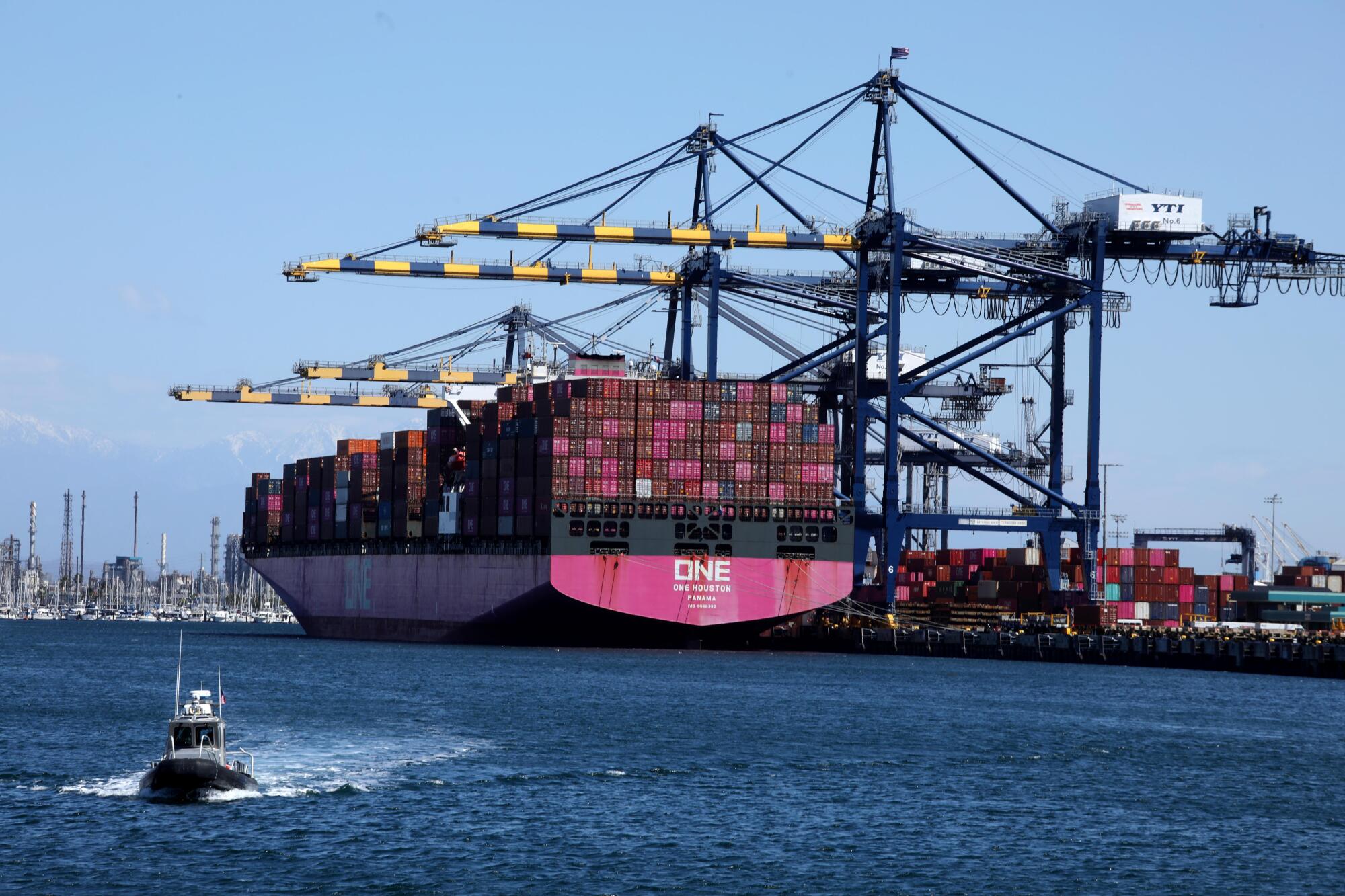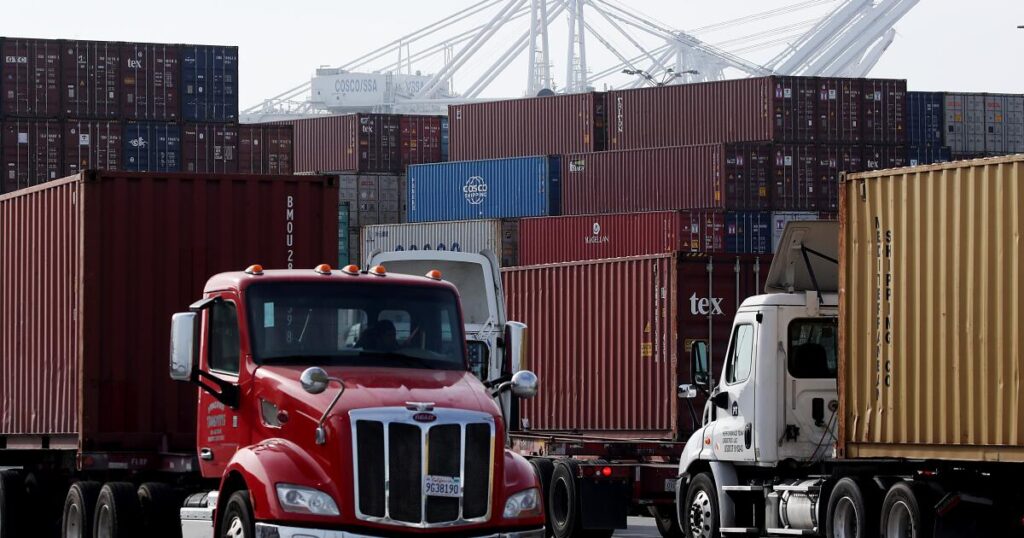Due to the Biden administration’s inaction, more than 1,000 diesel-powered freight trucks that would have been barred from serving California ports were allowed into the ports of Los Angeles and Long Beach, according to port records.
In April 2023, the California Air Resources Board voted to ban new registrations for large rigs powered by fossil fuels serving the state’s 12 major seaports, a landmark regulation set to take effect on January 1.
But a year later, the EPA has still not granted an exemption to California’s so-called Advanced Clean Fleet rules. As a result, state air regulators have been unable to enforce the rule, allowing trucking companies and independent operators to continue adding diesel-sipping big rigs that could pollute port communities for up to a decade.

Positive and impactful reporting on climate change, environment, health and science.
More than 1,200 trucks have been newly registered to transport cargo at the ports of Los Angeles and Long Beach since the beginning of the year, according to data obtained by the Los Angeles Times. About 92% of newly registered trucks are equipped with diesel engines, which are known to emit cancer-causing particles and planet-warming carbon emissions.
The Advanced Clean Fleet Rule is one of eight clean air policies that California regulators are still awaiting signature from the Biden administration. The rules are expected to prevent 11,000 premature deaths over the next three decades and provide $116 billion in health benefits, according to the American Lung Association.
But that’s assuming the rules can be implemented on time.
Seven of the eight pending policies should already be in effect. Federal inaction has led to delays in adopting zero-emission technologies or reducing emissions from trucks, ships, trains, construction machinery and lawn equipment. Delaying implementation of the policy could have ramifications across the country, as several other states have expressed interest in adopting California’s stricter rules instead of the EPA’s.
Heading into an unpredictable election year with battles over the presidency and both chambers of Congress, environmental advocates want to see the rules prioritized.
“Any further delay in the exemption process does run the risk that we will see more diesel trucks on the road or working at ports,” said Will Barrett, the American Lung Association’s national senior director of clean air policy. “We will also see more gasoline-powered equipment, such as leaf blowers and lawn mowers, where sales should have been halted. The transition to zero-emission technologies in these industries has been delayed, and because of this, we fear we will only see These devices continue to exist, producing more pollution, for longer than they should.
The EPA declined to comment on the increase in diesel trucks at Southern California ports and the pending exemption for advanced clean fleets.
Environmental experts say the Biden administration has been busy with its own crowded federal environmental agenda, which may have slowed the review of California regulations. Last year, the EPA approved new regulations targeting cars, heavy-duty trucks, new coal- and gas-fired power plants and oil wells that leak methane.
These federal rules are expected to have little impact in California, where regulations are already more stringent.
Due to poor air quality, California is the only state that can regulate vehicle emissions, as long as it gets a permit from the U.S. Environmental Protection Agency. The state used those powers to enact groundbreaking rules, such as requiring cars to have catalytic converters and a check engine light.
“This is the dance that’s been going on since the mid-1960s,” said Ann Carlson, an environmental law professor at UCLA and a former transportation czar in the Biden administration. “California leads the way, in part because the EPA granted the exemption. Then California drives the rest of the country.
Last week, Gov. Gavin Newsom and state rulemakers touted news that sales of new zero-emission trucks had doubled in 2023 from the previous year, putting the state two years ahead of its goal. This was primarily driven by sales of thousands of midsize pickup trucks, such as Ford’s F-150 Lightning and Rivian’s R1 series.
Zero-emission big rigs represent only a fraction of sales and the existing fleet serving state ports.

All the containers we saw coming into the Port of Los Angeles in March have to go somewhere. Currently, most will be installed on diesel-powered large rigs.
(Genaro Molina/Los Angeles Times)
When asked about the unfinished Advanced Clean Fleet rule, state officials were optimistic the Biden administration would take action.
“We are certainly eagerly waiting for the EPA to grant us a waiver, and we hope they will act soon,” said Steven Cliff, executive director of the California Air Resources Board.
“We are seeing one in six new trucks sold being zero-emission,” Cliff added. “Going forward, this will benefit Californians, especially those who live near ports and are most affected by pollution. Serious people.
Nearly 23,000 freight trucks are registered at the Port of Los Angeles, the busiest container port in the Western Hemisphere. About 94% of these are diesel trucks and the other 5% are natural gas trucks. One percent is zero-emission: 271 vans are battery-electric, 9 of which are hydrogen fuel-cell.
The Port of Los Angeles announced last year that it had reduced diesel particulate matter by 88% since 2005, in part due to better ship control and cleaner truck engines.
Starting with a ban on fossil fuel truck registration in 2024, the Advanced Clean Fleet Rule is expected to rapidly accelerate the adoption of zero emissions. Trucking companies went on an acquisition spree in the year leading up to the deadline, according to public records.
More than 9,000 trucks received new registrations at the two ports in 2023, almost three times the number registered in 2018.
Diesel truck registration will continue until the first half of 2024. 76 electric trucks and 19 hydrogen trucks were simultaneously approved to transport cargo.
Many of the truckers who serve the port are independent owner-operators who run their own small businesses with large drills rather than working for large companies with fleets of trucks. They expressed concern about the high upfront cost of purchasing an electric truck, which is much more expensive than diesel-powered models.
Mercer Transport Co., an owner-operated transportation company, registered its highest number of trucks yet in 2024, registering 131 diesel trucks at two ports, including several with engines more than 10 years old. Performance Team Freight Systems Inc., a Santa Fe Springs-based company, has launched the largest number of zero-emission vehicles, including 23 electric trucks.
Under fleet rules, existing fleets of diesel and natural gas trucks will be allowed to visit ports until they are 18 years old or have traveled a maximum of 800,000 miles. Trucks with more than 800,000 miles only last 13 years.
Agmark Transport registered a diesel truck with the engine in 2000, which would not have been allowed if the EPA had granted California a waiver.
The delayed regulations would also ban any fossil fuel trucks from transporting cargo at the port in 2035.
“What we fully expect and strongly support is that when these waivers are officially signed, anything that increases pollution beyond what these programs are designed to do needs to be addressed quickly,” said the American Lung Association’s Barrett. “If the port hauls fleets “Hundreds of diesel trucks have been added and we will be calling on our state agencies to look at these trucks and see what they can do to remove these trucks from the fleet as quickly as possible.”

